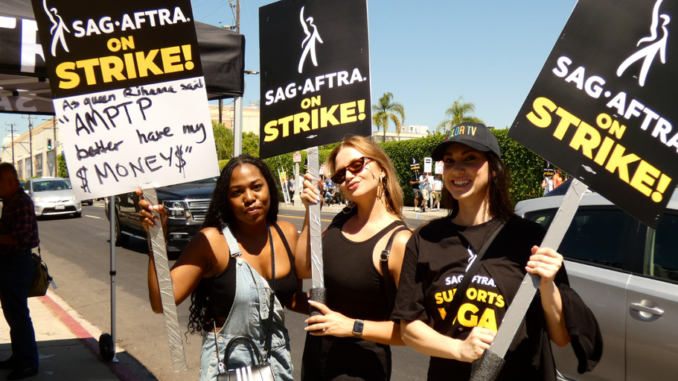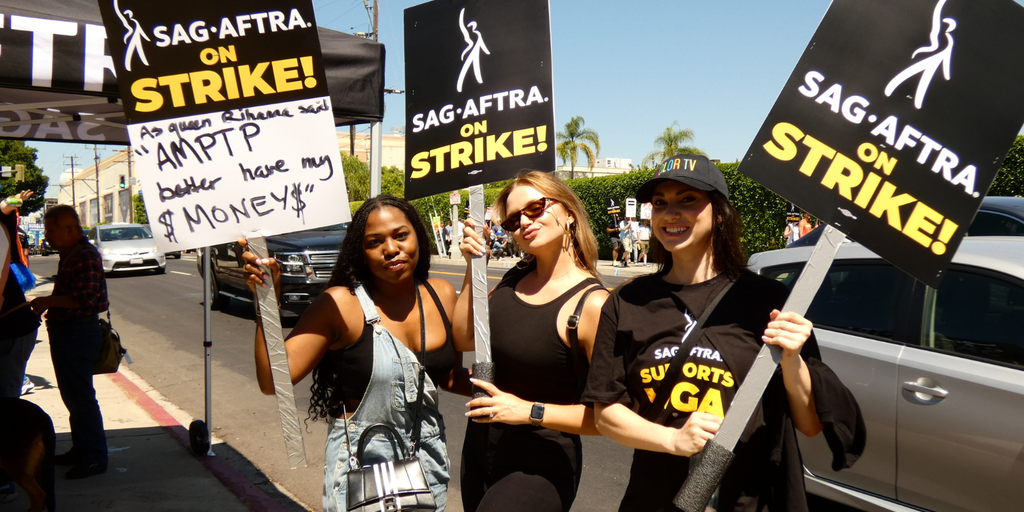
[ad_1]

The Writers Guild of America has reached a tentative agreement with the Alliance of Motion Picture and Television Producers after a 146-day strike that crippled Hollywood, the guild announced Sunday night.
The tentative three-year deal ends the longest strike in the guild’s history and comes after marathon negotiating sessions between the WGA and AMPTP over the weekend, according to the Los Angeles Times. The agreement still needs to be ratified by the WGA’s 11,500 members.
The WGA and AMPTP have reached a tentative agreement. This was made possible by the enduring solidarity of WGA members and extraordinary support of our union siblings who stood with us for over 146 days. More details coming after contract language is finalized. #WGAStrike pic.twitter.com/GBg2wZBwGB
— Writers Guild of America West (@WGAWest) September 25, 2023
A key issue in the negotiations was regulating the use of artificial intelligence in film and TV writing. The WGA sought strict limits on AI-written scripts, while studios wanted more leeway to experiment with the emerging technology. According to Variety, the tentative deal includes “groundbreaking additions” around the use of AI, though details remain unclear.
The ongoing debate over AI highlights concerns among writers that the technology could eventually displace human creatives, some telling Decrypt that AI “isn’t writing—it’s scraping other people’s work… it’s a plagiarizing machine.” Meanwhile, studios argue AI can be a collaborative tool to aid writers, not replace them entirely.
How the new contract balances those views will become clear when specifics emerge. But the AI provisions represented a major sticking point.
Beyond AI, the tentative pact also reportedly includes gains for writer pay and residuals, especially for shows on streaming platforms.
“We can say, with great pride, that this deal is exceptional—with meaningful gains and protections for writers in every sector of the membership,” the WGA Negotiating Committee wrote in a message to members Sunday evening, according to Deadline.
“To be clear, no one is to return to work until specifically authorized to by the Guild—we are still on strike until then,” the statement continued. “But we are, as of today, suspending WGA picketing.”
“I want to thank every single WGA member, and every fellow worker who stood with us in solidarity,” WGA negotiating committee member Adam Conover said on Twitter. “You made this possible.”
The Los Angeles Times reported the deal was made possible by the “willingness of this membership to exercise its power, to demonstrate its solidarity” through the strike.
The strike began May 2 after the previous WGA contract expired without a new deal in place. It brought film and TV production to a standstill, halting work on numerous high-profile movies and shows.
According to The Hollywood Reporter, the work stoppage was a response to concerns that shorter TV seasons and the rise of streaming have cut into writers’ compensation. For instance, streaming shows often have fewer episodes per season compared to network TV.
The strike immediately impacted filming in Los Angeles, which declined 29% in the second quarter compared to last year, according to data from the non-profit FilmLA.
As the stoppage dragged on, many Hollywood workers faced financial strain. Some crew members relocated out of state, risked losing health coverage, or struggled to pay their bills without steady studio work, Variety reported.
The studios also felt pressure as costs mounted and releases were delayed. For example, Netflix postponed the new season of its megahit Stranger Things, while other major projects like Marvel’s Blade sequel remained stalled.
According to the WGA statement, the “enduring solidarity” of guild members provided leverage after months of unsuccessful talks to reach an agreement studios hope will restart production.
The studios were represented in negotiations by the AMPTP, which includes entertainment giants like Netflix, Disney, Warner Bros., Discovery, Sony and Amazon.
Now the focus turns to the WGA’s upcoming ratification vote on the deal. The negotiating committee said it will provide comprehensive details on the agreement before members vote.
The strike remains in effect until that process concludes. But AMPTP President Carol Lombardini will likely now shift focus to negotiating with the Screen Actors Guild, which has been on strike since mid-July.
Getting actors back on set is key for studios hoping to resume production on films and shows impacted by the dual strikes.
But SAG-AFTRA has stood in solidarity with the WGA, and likely will closely watch how writers respond to the deal before making their next move. In the interim, the WGA has encouraged its members to “join the SAG-AFTRA picket lines this week.”
The entertainment industry will breathe a collective sigh of relief if writers ratify their contract and actors follow suit. But after months of lost wages and production delays, restarting the creative engine in Hollywood won’t happen overnight.
Editor’s note: This story was drafted with Decrypt AI from sources referenced in the text, and fact-checked by Ozawa.
Stay on top of crypto news, get daily updates in your inbox.
[ad_2]
Source link




